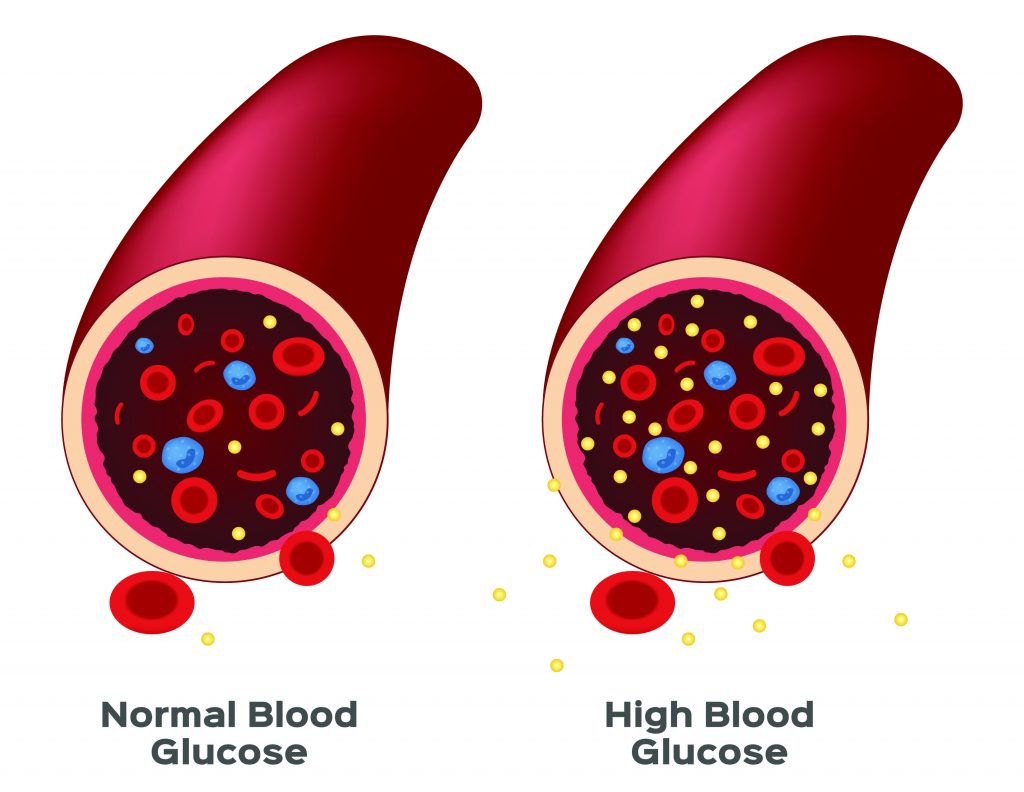What Is High Blood Sugar?
Blood glucose, or blood sugar, is an energy source that the bloodstream delivers to all the cells in the body in order to sustain vital functions. Keeping blood sugar levels stable and within a healthy range helps to avoid the onset of disease and degeneration that can lead to diabetes, heart disease, and even cancer.

Your blood glucose levels fluctuate throughout the day. Your job in consuming a healthy diet is to consume enough glucose to fuel your body’s cells properly without overloading your bloodstream continually. Your glucose levels will rise after eating, and will generally return to a stable point about 90 minutes after eating. Your fasting blood sugar is at its lowest point before the first meal of the day.
What happens when blood sugar levels go too high?
Blood sugar that is consistently high is a sign of hyperglycemia, when the concentration of glucose in the blood is too great. Common symptoms of hyperglycemia include: fatigue, lightheadedness, hedache, nausea, weakness, dry mouth.
Hyperglycemia
Hyperglycemia is a condition in which the blood glucose (blood sugar) level is too high. The medical community defines hyperglycemia as blood glucose higher than 130 milligrams per deciliter (mg/dL) in a person who hasn’t eaten anything for the previous eight hours or higher than 180 mg/dL up to two hours after a meal.

Normally, the body processes the sugars and starches from food into glucose, which the body uses as a source of energy. Any glucose that doesn’t get used by the muscles is stored in the body as fat or removed through body waste. Hyperglycemia occurs when the body fails to remove enough excess glucose from the blood stream.
Hyperglycemia Symptoms
Early symptoms:
• Blurred vision
• Fatigue (feeling unusually weak or tired)
• Headaches
• Increased or excessive thirst
• Trouble concentrating
• Urinating more frequently than normal
• Unintentional weight loss
In the shorter term, high blood glucose can lead to chronic constipation or diarrhea, erectile dysfunction, joint problems, skin infections, slow wound healing, tooth/gum infections and worsening vision. Ongoing hyperglycemia can lead to blood vessel, nerve and organ damage.
Later symptoms:

• Abdominal pain
• Breath with a “fruity” smell
• Confusion
• Coma
• Dry mouth
• Nausea
• Shortness of breath
• Vomiting
• Weakness
How To Treat It
Complications of hyperglycemia can be serious and may require emergency medical treatment. If you have symptoms of hyperglycemia, are vomiting and can’t keep any food or water down, this is a medical emergency and needs to be treated immediately. Make an appointment to see your health care provider if you’re vomiting but still able to keep some food and water on your stomach or if you’ve had a fever for more than 24 hours.
“some conditions require treatment with additional insulin as a medication”
Treatment for ongoing hyperglycemia might include home glucose monitoring, or regularly testing your own blood sugar level. Emergency treatment for acute hyperglycemia may include giving fluids and electrolytes and in some cases insulin. Insulin in made naturally in the body by the pancreas and helps naturally keep the blood glucose level normal. Some conditions require treatment with additional insulin as a medication. When hyperglycemia is related to an infection, a doctor may also prescribe antibiotics.
Help Maintain Healthy Blood Sugar
Some things you can do for yourself to help maintain a healthy blood sugar range include drinking plenty of water, changes in eating habits and getting enough exercise. Drinking water helps remove glucose from the blood through urine as well as helping fight off dehydration.
A dietitian can help you determine whether it’s appropriate to make changes to your diet to help keep your blood sugar in the healthy range. It may be necessary to adjust the amounts of food and/or the kinds of food you eat.
Exercise is thought to help keep blood sugar at a healthy level, although certain forms of exercise can actually increase blood glucose level. If your blood sugar is high, ask your health care provider what kinds of exercise are right for you.

Stress and illness can also cause a temporary elevation in blood sugar. As part of an overall strategy for keeping your blood glucose within the normal range, have a plan in place to deal with stress. While you’re recovering from an infection or illness, try to give yourself adequate time to rest and heal and be sure to drink enough water to prevent dehydration.
